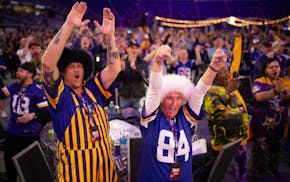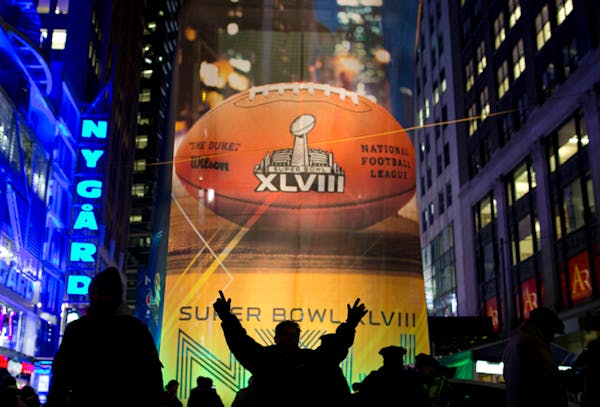NEW YORK – With the weather forecast improving by the day, the first outdoor Super Bowl in a cold-weather venue isn't even expected to produce the coldest on-field starting temperature in Super Bowl history.
Sunday's forecast for East Rutherford, N.J., home of MetLife Stadium and Super Bowl XLVIII, calls for a high of 49, a low of 29, minimal to no wind and up to only a 20 percent chance of precipitation. The coldest on-field temperature at kickoff was 39 degrees at New Orleans' Tulane Stadium when the Cowboys beat the Dolphins 24-3 in Super Bowl VI on Jan. 16, 1972.
That's good news for a league that was concerned about the possibility of a blizzard affecting a game that includes great but less than strong-armed quarterback Peyton Manning trying to lead Denver's record-setting offense to a legacy-stamping victory over Seattle's No. 1-ranked defense.
It's also potentially good for Minneapolis, one of three finalists for Super Bowl LII, which is to be played in February 2018.
Yes, the new Vikings stadium will have a roof, so the elements would be controlled. But a blizzard on game day with the entire world watching the game and then snarled-up traffic outside the stadium might not be the fresh image that would benefit Minneapolis when its detailed sales pitch is presented to the league's owners in March. Owners will then vote on the bids by Minneapolis, Indianapolis and New Orleans in May.
NFL Commissioner Roger Goodell had fun with all the focus that has been placed on the weather this week. As he opened his annual Super Bowl news conference Friday, fake snow began to fall from above him.
"I told you we were going to embrace the weather," Goodell said with a smile.
As usual, Goodell was asked several questions about future Super Bowl sites. And, as usual, Goodell answered the questions without really answering the questions.
"We know there's interest in other communities hosting the Super Bowl," he said. "I think the ownership will sit back and review that when we're done, but we have a very aggressive process in how we select cities.
"The ability to host the Super Bowl is more and more complicated, more and more complex because of the size and number of events. The infrastructure is very important. There are over 30,000 hotel rooms needed even to host the Super Bowl so there are some communities that may not be able to do it from an infrastructure standpoint, but we know the passion's there."
Next year's Super Bowl is in Glendale, Ariz. The new 49ers stadium in Santa Clara, Calif., is up after that, followed by a return to Houston for the first time since 2004.
Minnesota hasn't played host to a Super Bowl since its one and only time in 1992, 10 years after the Metrodome opened. The outdoor temperature that day was 26 degrees, according to the Pro Football Hall of Fame's website.
New Orleans played host to last year's Super Bowl. Indianapolis was the host two years ago.
Minnesota Gov. Mark Dayton planned to be in New York for the weekend to lobby for a Super Bowl but canceled his travel plans earlier this week.
Lester Bagley, Vikings vice president of public affairs/stadium development, said the contingent working on the Minneapolis bid was encouraged to hear Goodell say the league is looking for opportunities to "come into new markets" and that "the number of cities that are going to get multiple Super Bowls at one time, I think, are incredibly limited." Bagley also said the Minneapolis contingent believes fans and the league have embraced the outdoor venue for Super Bowl week, including the "Super Bowl Boulevard" on Broadway in New York City.
"That's been spectacular," Bagley said. "That would look great on Nicollet Mall in Minneapolis. So there are a lot of great things for Minneapolis and St. Paul to bring to the table."

